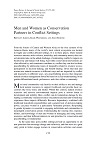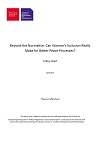-
Examining Women’s Inclusion in Peace and Conservation Efforts
September 4, 2015 By Carley Chavara Some of the world’s most crucial ecosystems can also be found in the most conflicted areas. The most progressive peace agreements in these circumstances sometimes include conservation protections, but fewer still include women – and that’s a an article in Peace Review by Conservation International’s Brittany Ajroud, Kame Westerman, and Janet Edmond. Peace agreements in these places are more successful when they foster more equitable resource access and benefits sharing, they write, and because men and women use and access resources differently, it is important that both are present and contribute at negotiations. Achieving a female presence at peace agreements can be difficult as women face several obstacles including intimidation, not knowing official languages used at negotiations, and inability to attend meetings if they must watch children.
Some of the world’s most crucial ecosystems can also be found in the most conflicted areas. The most progressive peace agreements in these circumstances sometimes include conservation protections, but fewer still include women – and that’s a an article in Peace Review by Conservation International’s Brittany Ajroud, Kame Westerman, and Janet Edmond. Peace agreements in these places are more successful when they foster more equitable resource access and benefits sharing, they write, and because men and women use and access resources differently, it is important that both are present and contribute at negotiations. Achieving a female presence at peace agreements can be difficult as women face several obstacles including intimidation, not knowing official languages used at negotiations, and inability to attend meetings if they must watch children. Another report, Beyond the Normative: Can Women’s Inclusion Really Make for Better Peace Processes?, by the Graduate Institute of Geneva, further interrogates the role of women in conflict resolution. Women are often included on a normative basis due to the lack of research-based knowledge on the significance of their participation. The institute sought to address this through a multi-year project that combined evidence from 40 case studies between 1990 to 2013. They found that the inclusion of women in peace negotiations does increase the likelihood of an agreement, but critically only if they have real influence on the process. “Making women count is more important than just counting women,” writes Paffenholz. She recommends continuing to support women’s participation in negotiations, including in pre-negotiation and implementation phases, problem-solving workshops, and consultations. She also recommends enhancing the gender-awareness of mediators, facilitators, and others involved in the negotiations to ensure women have input.
Another report, Beyond the Normative: Can Women’s Inclusion Really Make for Better Peace Processes?, by the Graduate Institute of Geneva, further interrogates the role of women in conflict resolution. Women are often included on a normative basis due to the lack of research-based knowledge on the significance of their participation. The institute sought to address this through a multi-year project that combined evidence from 40 case studies between 1990 to 2013. They found that the inclusion of women in peace negotiations does increase the likelihood of an agreement, but critically only if they have real influence on the process. “Making women count is more important than just counting women,” writes Paffenholz. She recommends continuing to support women’s participation in negotiations, including in pre-negotiation and implementation phases, problem-solving workshops, and consultations. She also recommends enhancing the gender-awareness of mediators, facilitators, and others involved in the negotiations to ensure women have input.Sources: Graduate Institute of Geneva, Peace Review.
 A Publication of the Stimson Center.
A Publication of the Stimson Center.





